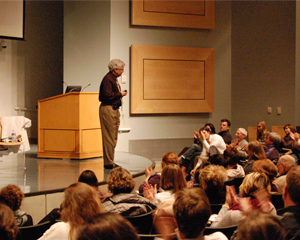Mini Med School expansion aims to teach people what doctoring is all about
Dennis Boyle, M.D., speaks Wednesday at Mini Med School Part 2 on the Anschutz Medical Campus. Attendees learned about the doctor-patient relationship. (Photo courtesy of Helen Macfarlane)
Everyone visits a doctor now and then, but some still feel intimidated or even frustrated by the process and the health care system. Educating people on what doctoring is all about is one of the missions of Mini Med School Part 2: The Clinical Years. The pilot program is an offshoot of the popular Mini Med School that was founded in 1989 by J. John Cohen, M.D., Ph.D., a University of Colorado medical school professor of immunology and medicine.
While the original Mini Med School sessions were based on the science taught during the first two years of medical school, Mini Med 2 focuses on the final two years of education, when med school students spend their time in wards and clinics seeing patients, said Stephen Wolf, M.D., who with Dennis Boyle, M.D., leads the program. Both are faculty at CU’s School of Medicine.
Wolf said the intent of the program is to demystify the health care system for the community and empower people to interact with it.
“We thought it would be interesting to try to educate people about what’s more familiar to them, more doctoring with a stethoscope, more like (television shows) ‘ER’ and ‘House,’” said Boyle, a rheumatologist at Denver Health who also specializes in medical communications. “We want to help people be healthier and more proactive in their own health care.”
Said Wolf, an emergency physician at Denver Health, “We’ve all had family members that don’t understand what’s going on, so we want to show the audience how to look at the system and the process through the eyes of a medical student.”
Doctors who try to understand a disease from the viewpoint of the patient become better at meeting their patients’ expectations, needs and wants, he said. Similarly, patients who understand the health care system and the disease process are more likely to understand what a physician is looking for, which can lead to a more productive and effective relationship between the two.
Boyle led the first session of Mini Med 2 at the Anschutz Medical Campus on Wednesday night; it dealt with the doctor-patient relationship. Other topics that will be explored during the eight-week program include some of the most common ailments such as heart disease, pneumonia and smoking, and diabetes and obesity. Additional classes will examine the areas of trauma and injury prevention, childhood development, mental health, and pregnancy and childbirth. All of the people leading the sessions are experts in their fields and experts at educating others, said Wolf.
While an original Mini Med School lecture might discuss how a heart works, the pilot program’s aim is to detail how the heart works in a certain patient, how the heart ails, and how the patient can be treated now and in the long term to improve the situation, said Wolf.
The classes also will be more interactive, said Wolf, using real-world patient case studies and more audio-visual cues. During the heart session, for instance, “we’ll talk about what it means when someone has to have a catheter inserted in a groin blood vessel and show the actual video of the dye being injected into the bloodstream.”
Boyle thinks the last session will be the most “fun” as doctors discuss pregnancy and will “deliver” a baby using Noelle, an advanced technology mannequin that is programmed to simulate a real woman, including “vocalizing” the discomfort she “feels.”
About 18,000 people have participated in the original Mini Med School programs. Both founder Cohen and Helen Macfarlane, who Boyle calls “the person behind the scenes who makes everything work,” have been supportive of the Part 2 program.
The sequel already seems to be popular. Reservations were capped and a waiting list established well before the first session. Priority was given to those people who had graduated from one of the original programs.
“At the core we’re educators and gain immense satisfaction from delivering knowledge to people who have a thirst for it,” said Wolf.
Sessions for Mini Med School Part 2 are: The doctor-patient relationship, led by Boyle; Heart disease and risk modification, Lawrence Hergott, M.D.; Trauma and injury prevention, Wolf; Childhood development, Jennifer Soep, M.D.; Mental health, David Wahl, M.D.; Pneumonia and smoking, Robert Winn, M.D.; Diabetes and obesity, Daniel Bessesen, M.D.; and Pregnancy, delivery and prenatal care, Gerald Zarlengo, M.D.
For more information, visit http://medschool.ucdenver.edu/minimed.


